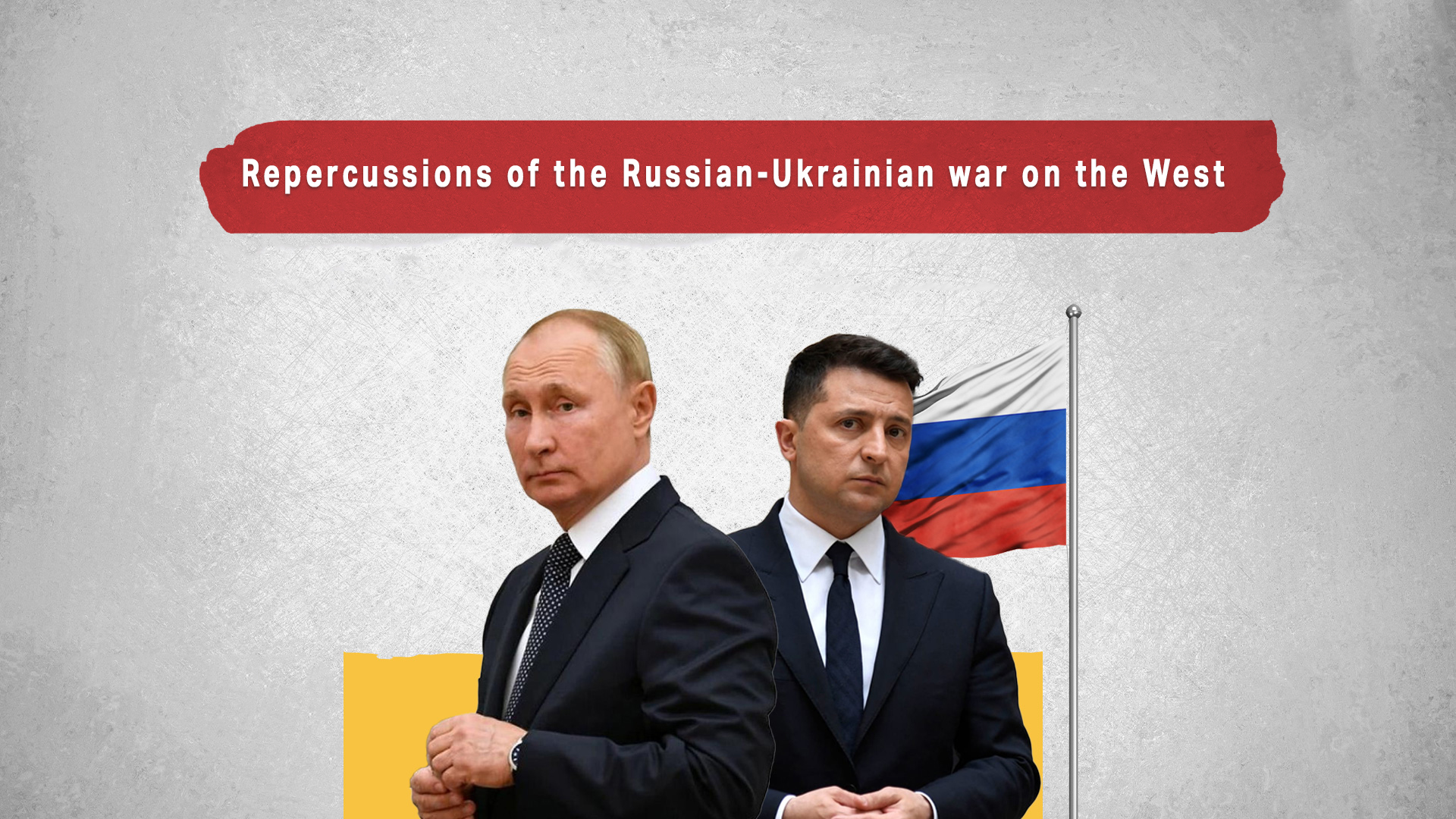Repercussions of the Russian-Ukrainian war on the West

Putin, who appeared as the strong leader during the past years who restored Russia’s prestige on the international scene as a superpower, lost sight of the dangers of the Western “NATO” advance towards the east, as Russia started to lose its surroundings. NATO included 11 new countries. Russia lost its presence and popular influence in some neighboring countries, such as Ukraine. All of this has become a threat to Russia’s national security. In the face of these conditions, Putin has found no solution but military escalation against the West, and he launched a war on Ukraine to ensure that no new strikes are received.
With the declaration of Russia-Ukraine war, NATO began to move and strengthen its eastern front to prevent any Russian invasion of the alliance countries without getting involved in the war, leaving Ukraine alone to face its fate. It just satisfied with imposing economic sanctions on Moscow and providing military support to Kiev, but these sanctions, which the alliance sees as paralyzing Moscow’s ability in its war on Ukraine, were not that serious, which affected Moscow in the beginning. The severity of the sanctions varied from one country to another according to their economic interests with Moscow and their fear of a Russian backlash that could affect their economy. Some countries even opposed imposing sanctions on Moscow.
Why did the Russian president wage war on Ukraine at this time while he was watching the joining of the countries surrounding Russia to NATO?
Putin was aware of the dangers of the eastern European countries joining NATO and threatening his national security, but he did not have the strength to stand up to the West and prevent it from annexing new countries, except after strengthening Russia’s internal front and exploiting the crises of the Middle East to strengthen Russia externally. The Syrian crisis gave Russia a foothold in the Mediterranean. It made Syria an advanced military base for it through the Khmeimim Air Base in the face of NATO, and established strong relations with gas-exporting countries, and even with the countries importing Russian gas (Germany and Turkey) by linking them to economic projects (Nord Stream) which enabled it to protect its gas supplies to European countries. Also, through interfering in the Middle East crises, Russia stopped Western projects to transport gas from the Middle East to Europe. The European countries have not been able to do without Russian gas so far, which hinders them to take a strong position towards the Russian invasion of Ukraine. However, it seems that the developments of the Russian-Ukrainian war are accelerating and the Western countries have become more insistent on imposing sanctions on Russia. Many countries have closed their airspace to Russian aviation, and some countries have closed their ports to Russian shipping, and removed some Russian banks, which so far amounted to seven banks of the Swift system, along with the withdrawal of oil and gas giants (Shell and Petroleum) from Russia, which aims to stifle Moscow by putting pressure on the arteries of the economy. The exit of major foreign energy companies will greatly disrupt production and investment in the oil and gas sectors, as oil and gas revenues constitute 36% of the public budget. All this prompting Russian President Vladimir Putin to put the deterrence force of the Russian army on alert accusing the West of taking “aggressive” positions towards his country.
It is easy to declare war, but it is difficult to stop it, and increasing sanctions on Moscow makes things more complicated, which may push Russia to stop gas and oil supplies to Europe, the matter European countries fear. So, despite the withdrawal of major oil and gas companies from Russia, Western sanctions did not affect the supplies of Russian gas and oil, and it is a strong card in Russia’s hand towards the West.
The European countries are among the most affected by the Russian-Ukrainian war, the rise in the global gas and oil prices, the wave of immigration, and the future of the economic investments between the two parties. On the other hand, the United States is the biggest beneficiary of the war, where the sanctions imposed on Russia will bear fruit in the near future, which may dislodge Russia as a competitor to the United States as a second pole. The Russian invasion of Ukraine can be compared to the Iraqi invasion of Kuwait and how Iraq was neutralized as a regional power, and the war made European countries more attached to the United States as a powerful party that is able to protect its national security. Therefore, prolonging the war will serve the United States in maintaining its global position and will drain Russia’s military and economic capabilities. This will make the US to devote itself for facing China in the near future, in the event that Russia cannot end the war in its favour. What proves that the United States wants to prolong the war is its contentment with imposing economic sanctions on Russia and sending its soldiers to Eastern Europe, and its unwillingness to engage in any negotiations with Russia. The Russian-Ukrainian negotiations will not bear any fruits at the present time unless the major countries engage in these negotiations. On the contrary, the war will continue and the situation may move towards dividing Ukraine like Germany into two parts east of the Dnieper River with the coasts of the Black Sea under Russian control and west of the Dnieper River Under Western protection, and in the event the Russians entering Kyiv, it is likely that NATO would impose an air embargo on the west of the Dnieper River, in order to protect NATO countries from any Russian invasion. Although this division will affect Europe, it will be a strong card in the hands of the United States for the continuation of sanctions against Russia.




